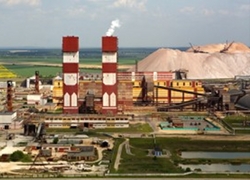Financial Times: "Belaruskali" is trying to deceive the West
12- 5.07.2012, 14:59

The company hopes not only to avoid sanctions, but to get cheap loans.
To put it mildly, Belarusian companies are not in favour in the EU and the US. Thanks to the authoritarian nature of the government, which has a habit of arresting opposition activists, leading regime supporters and officials hit with western economic sanctions.
So it may make sense for one of the country’s largest companies, potash producer Belaruskali, and its Russian counterpart, Uralkali, to route its exports through a new joint venture trading company in Switzerland.
The new Swiss unit, Soyuzkali, is intended to take the place of the partners’ long-standing Minsk-based joint venture sales company, Belarusian Potash Company (BPC), and Uralkali’s own existing Swiss-registered trading company.
“Both the draft agreement to set up the trader and Soyuzkali’s draft articles of association have it that all of the fertilizers with some minor exceptions will be sold via Soyuzkali,” first deputy prime minister Vladimir Semashko told beyondbrics.
Uralkali and Belaruskali export 16-17m tonnes of potash-based fertilizers annually, close to one-third of current global consumption. BPC reported potassium chloride exports at 12.9m tonnes in 2011, including all of Belaruskali’s foreign shipments 7.7m tonnes.
The new company may help minimise the risks of the Belarusian potash industry, a key supplier of foreign currency to the state budget, becoming a target of any extension of the economic sanctions imposed by the EU or the US on the regime of president Alexander Lukashenko.
Since the December 2010 presidential election in Belarus, which was condemned by the international community and was followed by arrests of opposition presidential candidates, the west has imposed sanctions on Belarusian officials, tycoons and state-owned enterprises.
The US has imposed sanctions against six large state-controlled oil and chemistry groups, including Naftan, one of the country’s two oil refineries. For its part, the EU has imposed sanctions against several tycoons suspected of backing the regime; sanctions were imposed against more than 30 companies controlled by these tycoons.
By working together via Switzerland-based trader, Uralkali and Belaruskali will also benefit from preferential tax treatment and access to cheap loans, which BPC cannot get now. In June, Semashko told reporters in Minsk that Soyuzkali “would be a Swiss economic agent enjoying a preferential tax regime.”
He said: “The main thing is that it will have access to cheaper loans, because both Uralkali and Belaruskali need cheap resources to develop their production and the common trader. It is one thing to borrow at 10-12 per cent and a totally different thing to take loans at 2-3 per cent.”
Furthermore, given the current tensions between the Belarusian authorities and the West, organisations run by the Belarusian government find it hard to deal with banks in the EU and US. For instance, in 2011, BNP Paribas, Deutsche Bank and The Royal Bank of Scotland refused to support state projects in Belarus.
The Belarusian authorities have announced that the new trader will start operating in February 2013, but Uralkali is less optimistic. Its CEO Vladislav Baumgertner told Russian Prime newswire that it was planned to have the project okayed by the antitrust service and complete other legal procedures “by the end of 2013.”
Setting up a joint trader follows Uralkali’s repeated statements about its interest in taking a controlling stake in Belaruskali. The Belarus state, has repeatedly discussed privatisation, but has never developed concrete proposals and has recently appeared to have got cold feet about losing control of one of its key assets.
In 2011, the Belarusian authorities said that Belaruskali could be sold for $30bn and were ready to sell any stake based on this price. However, Belarus now looks reluctant to sell a controlling stake, while increasing the total asking price of the asset to $31.5bn-32bn.









